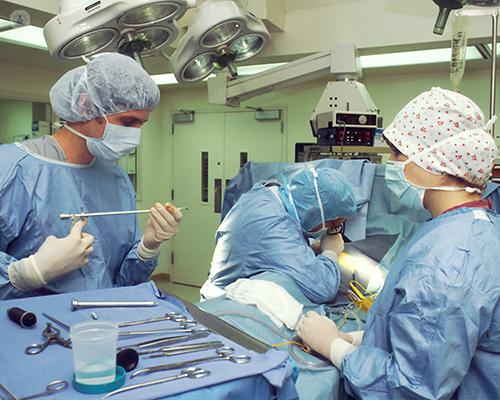What is retzius sparing prostatectomy?
Written in association with:What is retzius sparing prostatectomy?
Robotic Retzius-sparing radical prostatectomy is a surgical technique which is used for the treatment of prosate cancer. It is a minimally invasive surgical technique.
The surgery involves use of a surgical robot to remove the prostate gland while sparing the Retzius space. This is a potential space between the bladder and prostate gland.
During the RRP procedure, several small incisions will be made in the abdomen. The surgeon will insert small surgical instruments and a camera attached to the robotic arms.

Robotic arms are then used to remove the prostate gland while preserving the surrounding nerves, blood vessels, and muscles.
This technique is used with the purpose of reducing urinary incontinence and erectile dysfunction, which are common side effects of traditional prostatectomy procedures.
Use of the robotic-assisted approach permits greater precision and control during surgery, resulting in better outcomes for patients.
What evidence is there for retzius sparing prostatectomy?
My team and I have conducted and published research regarding the Retzius-sparing technique for prostatectomy. This technique involves preservation of the Retzius space during surgery to minimise damage to the urinary sphincter and improving postoperative continence outcomes.
Our research has involved comparing Retzius-sparing prostatectomy to traditional approaches. We disovered that the Retzius-sparing technique resulted in better early continence outcomes and lower rates of urinary incontinence at 3 and 12 months after surgery. We also found that the Retzius-sparing approach did not increase the risk of positive surgical margins or complications.
What are the potential advantages of retzius sparing technique?
The Retzius sparing radical prostatectomy technique has some advantages in comparsion to standard robotic radical prostatectomy. These include:
- Lower risk of urinary incontienece. Retzius sparing prostatectomy can result in less damage to the muscles and nerves which control bladder function, resulting in lower risk of post-surgery urinary continence.
- Faster recovery of continence. Patients who undergo retzius sparing technique may regain urinary continence more quickly than those who undergo a standard robotic prostatectomy.
- Improved sexual function. Erectile function may be preserved by minimising nerve damage during surgery.
- Reduced blood loss. Retzius sparing prostatectomy patients tend to lose less blood than those undergoing standard robotic prostatectomy.
- Shorter operation time. Retzius sparing surgery is quicker than a standard prostatectomy.
What are the potential disadvantages of retzius sparing technique?
Retzius-sparing radical prostatectomy has gained popularity over recent years. However, there are some disadvantages to the surgery, which include the following:
- Increased surgical difficulty: the procedure requires specialised surgical skills and expertise because it is a complicated and difficult procedure.
- Nerve damage potential: despite the Retzius-sparing technique’s aims to preserve the neurovascular bundle, there is still a risk of nerve damage that can lead to erectile dysfunction or other sexual problems.
- Limited long-term data: results have been promising regarding the surgery thus far, however, there is still limited evidence regarding the safety and efficacy of Retzius-sparing prostatectomy.
- Unsuitable for all patients: It may not be suitable for every patient, espeically for patients with larger prostates or more advance cancer.
In general, Retzius-sparing prostatectomy has the potential to improve outcomes for some patients.
However, patients must carefully consider potential disadvantages before choosing this approach. It is also essential to discuss potential risks and benefits with an appropriate, qualified healthcare provider.
Tay LJ, Makin R, Saxionis I, Dokubo I, Patel K, Sivathasan S, Smart S, Warren A, Shah N, Lamb BW. Comparative analysis of early post-operative outcomes between retzius-sparing and anterior approach robotic radical prostatectomy for a single surgeon. Journal of Clinical Urology. 2023 Mar 1:20514158231156314.


